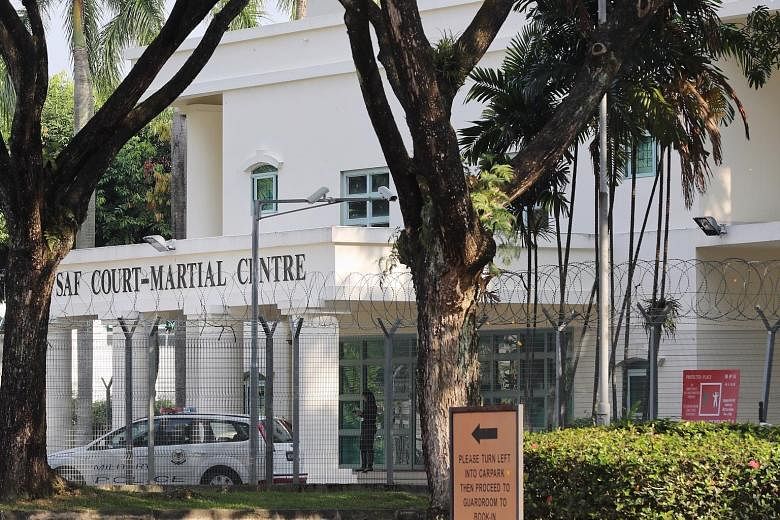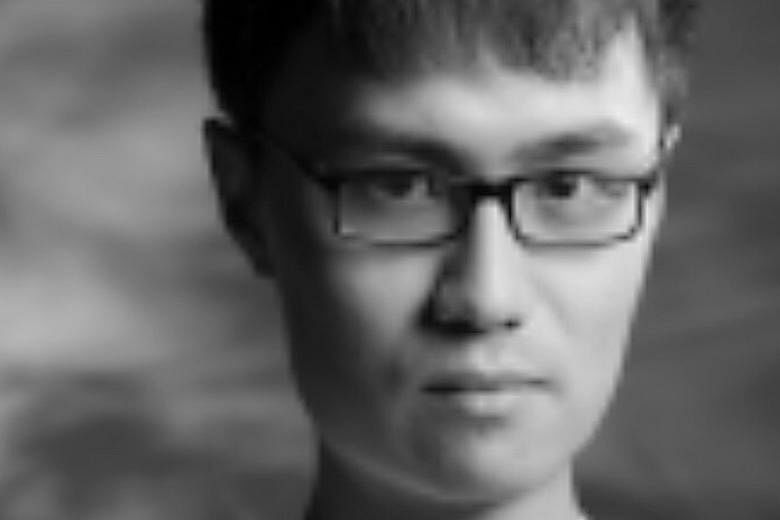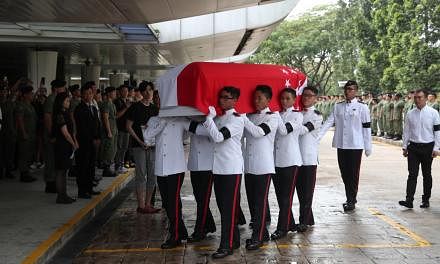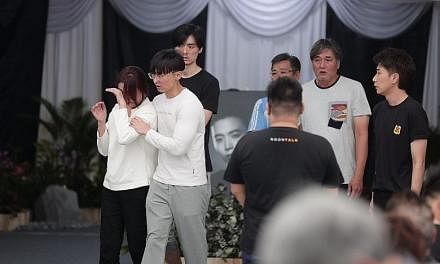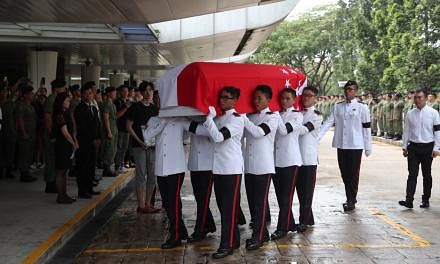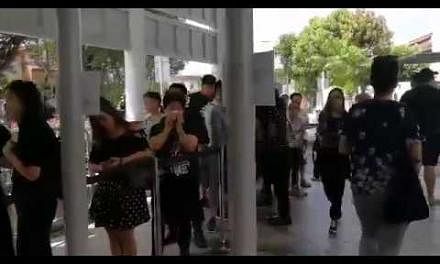Two soldiers who were in the cabin of a howitzer artillery gun with the late actor Aloysius Pang were charged in military court yesterday.
The first was Third Sergeant (NS) Hubert Wah Yun Teng, 31, an operationally ready national serviceman. The other was Military Expert 2 Ivan Teo Gee Siang, 35.
Wah, a gun commander, faces two charges: One charge of causing death by a rash act under the Penal Code, and one charge of causing death by a negligent act under the Penal Code.
A person convicted of causing death by a rash act faces a jail term of up to five years, a fine, or both. Anyone convicted of causing death by a negligent act may be jailed for up to two years, fined, or given both punishments.
Teo, a regular technician, faced three charges: One charge of disobedience of general orders under the Singapore Armed Forces Act, and two charges of causing death by a negligent act under the Penal Code.
A serviceman convicted of disobedience of general orders may be jailed for up to two years.
They were charged at the Court Martial Centre in Kranji Camp II. The military court martial is presided over by a serving State Courts judge.
The two servicemen looked solemn as they turned up in court in their green No. 4 uniforms accompanied by uniformed escorts, and confirmed that the charges had been read to them when asked by the judge.
The court heard that both servicemen have applied for pro bono legal services.
Proceedings were adjourned for four weeks for a pre-trial conference with a date yet to be fixed.
The judge granted bail of $5,000 each with surety and for the servicemen's passports to be impounded.
The court martial panel consisted of the judge, Lieutenant-Colonel (NS) Lim Keng Yeow, a district judge under the Family Justice Courts who is on his in-camp training, and panel members, Major Li Mei Fang from HQ Naval Diving Unit and Major Ong Zi Jun from HQ Air Combat Command.

Corporal First Class (NS) Aloysius Pang, an armament technician from the 268th Battalion Singapore Artillery, died on Jan 23, four days after he was seriously injured while in the Singapore Self-Propelled Howitzer (SSPH) during a live-firing exercise in New Zealand.
As CFC Pang, 28, died in New Zealand, the Singapore police do not have jurisdiction to conduct investigations into his death, said the Ministry of Defence (Mindef).
"Investigations into his death were conducted by the SAF's Special Investigation Branch (SIB), and the Chief Military Prosecutor has decided to prosecute the two SAF servicemen based on the investigation findings of the SIB," Mindef added.
The Chief Military Prosecutor is Ms Teoh Ai Lin, a senior legal officer deployed to Mindef by the Legal Service Commission, headed by the Chief Justice.
Reporting the findings of an independent Committee of Inquiry (COI) set up to investigate CFC Pang's death, Defence Minister Ng Eng Hen told Parliament in May that each of the three soldiers in the cabin of the SSPH had committed lapses that led to the actor's death.
Among other breaches, the three men - including the gun commander and the regular technician - failed to follow the requirement that everyone must be in safe positions during the movement of the gun barrel.
The regular technician also did not ensure the gun barrel was locked before starting the maintenance work of replacing the interface card found in the cabin.

Inspections of the SSPH have not detected any machine malfunction of the gun-lowering mechanism. CFC Pang, an operationally ready national serviceman, was injured when he was caught between the back of the gun barrel and the interior of the cabin.
The regular armament technician in the cabin with CFC Pang had been in service for more than 16 years, with eight years of working experience on the SSPH, Dr Ng said in Parliament on Feb 11.
It was also his sixth time participating as a technician in Exercise Thunder Warrior, which CFC Pang was participating in.
The gun commander was on his eighth in-camp training and had undergone refresher training prior to his deployment in the exercise, added Dr Ng then.
The COI also found that when CFC Pang was hit, in a state of panic, both servicemen had acted irrationally instead of pushing emergency stop buttons in the cabin.
How the military court works
According to the Singapore Armed Forces (SAF) Act, people subject to military law include military regulars, full-time national servicemen (NSFs) and NSmen who are ordered to report for service.
Offences under the SAF Act include absence without leave, abuse of authority, malingering, and falsification of documents.
The military court is presided over by a former or serving State Courts judge as president of the General Court Martial. The General Court Martial consists of the Judge Court Martial or Panel Court Martial.
Soldiers are brought before either one depending on the offence, according to a Straits Times report in 2016.
The Judge Court Martial, presided over by a district judge from the State Courts, deals with civil offences such as theft and drug consumption.
In the Panel Court Martial, the judge is joined by two military officers on a panel which deals with military offences.
Less severe offences are summarily tried. The soldier is charged before his commanding officer and does not go to court.
A military conviction does not necessarily translate into a civilian criminal record.
Lawyer Laurence Goh, who has handled many court martial cases, said: "Usually, an SAF conviction stays within the SAF unless it is a serious and registrable offence like rape or drug use."
Like the civilian courts, soldiers who are unhappy with their conviction or sentence can appeal to the Military Court of Appeal - the highest authority.
The SAF Act provides for detention and imprisonment.
Mr Goh said detention does not exceed two years, and imprisonment includes serving time in Changi Prison.
